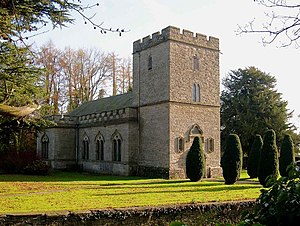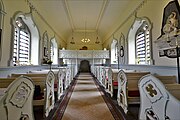| St John's Church, Shobdon | |
|---|---|
| Church of St John the Evangelist, Shobdon | |
 Church of St John, Shobdon | |
| 52°15′38″N 2°52′44″W / 52.2605°N 2.8788°W | |
| Location | Shobdon, Herefordshire |
| Country | England |
| Denomination | Anglican |
| Website | [1] |
| History | |
| Status | Parish church |
| Architecture | |
| Functional status | Active |
| Heritage designation | Grade I |
| Designated | 11 June 1959 |
| Architectural type | Church |
| Administration | |
| Diocese | Diocese of Hereford |
| Parish | Shobdon |
| Clergy | |
| Vicar(s) | Revd Prebendary Steve Hollinghurst |
The Church of St John is a Church of England parish church at Shobdon in the English county of Herefordshire. Of 14th century origins, the church was completely rebuilt between 1749 and 1752 for John Bateman, 2nd Viscount Bateman, in a Rococo style under the supervision of Bateman's uncle, The Honourable Richard Bateman, a close friend of Horace Walpole, and a member of his Committee of Taste.[1] Simon Jenkins, in his book England's Thousand Best Churches, considers the interior "a complete masterpiece (of) English Rococo,"[2] while Brooks and Pevsner describe it as "the finest 18th century church in Herefordshire."[1] It is a Grade I listed building.
History
The original church was probably constructed in the 14th century.[3] Arches from the interior of this building were removed in the 18th century to form an eye-catcher in the grounds of Shobdon Court, the Bateman family home.[1] The Shobdon Arches,[3] as they are known, have subsequently "weathered disastrously."[1] Between 1749 and 1752, John Bateman undertook a complete rebuilding in the Gothic Revival style.[3] The architect is unknown.[1] Bateman's uncle was a friend of Horace Walpole and many members of their circle have been suggested as possible designers, including William Kent, Daniel Garrett, Stephen Wright, John Vardy, Richard Bentley, William Robinson and Henry Flitcroft.[1] Jenkins himself favours Richard Bentley.[2] The style is clearly influenced by the contemporary Strawberry Hill House and the works of Batty Langley.[1]
The church remains an active parish church, part of the Arrowvale Group of churches.[4] The Parochial Church Council is supported by The Shobdon Church Preservation Trust, established to ensure; "The preservation and upkeep of St John the Evangelist Parish Church, Shobdon, a Grade 1 listed building, and the education of the public in the history and architecture of the church."[5]
Description
Exterior
The exterior is of "coursed rubble with a slate roof."[3] and with a standard arrangement of nave, transepts and chancel.[1] Ogee arches for windows and door cases proliferate.[1] The short tower contains a belfry.[3]
Interior
The exterior does not anticipate the "icing-sugar whiteness"[2] of the interior, with "Gothick, Rococo even Chinoiserie flourishes."[1]
Shobdon Arches
The Shobdon Arches is an eyecatcher created in the park at the time of the re-modelling of the interior of the church. It uses material from the original church, including the chancel arch. The Arches is a Grade II listed building[6] and a scheduled monument.[7]
Gallery
-
The Interior - "a masterpiece of English Rococo"
-
Another interior view
-
The East window
-
The Shobdon Arches eyecatcher incorporates material from the church
Notes
- ^ a b c d e f g h i j Brooks & Pevsner 2012, pp. 596–8.
- ^ a b c Jenkins 1999, p. 277.
- ^ a b c d e Historic England. "Church of St John the Evangelist (1166734)". National Heritage List for England.
- ^ "Shobdon Church Preservation Trust - The Church Today". Shobdonchurch.org.uk. 12 June 2014. Retrieved 9 October 2016.
- ^ "The Shobdon Church Preservation Trust". Shobdonchurch.org.uk. 12 June 2014. Retrieved 9 October 2016.
- ^ Historic England. "Shobdon Arches (Grade II) (1082094)". National Heritage List for England. Retrieved 19 January 2024.
- ^ Historic England. "Shobdon Arches (Grade SM) (1005365)". National Heritage List for England. Retrieved 19 January 2024.
Sources
- Brooks, Alan; Pevsner, Nikolaus (2012). Herefordshire. The Buildings of England. Yale University Press. ISBN 978-0-300-12575-7.
- Jenkins, Simon (1999). England's Thousand Best Churches. Penguin. ISBN 0-713-99281-6.













